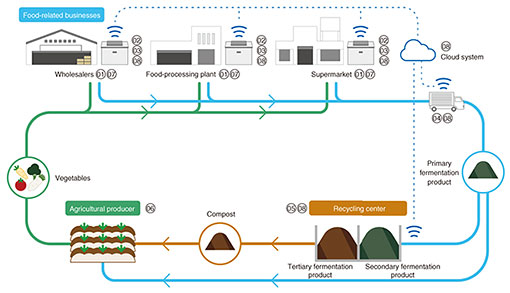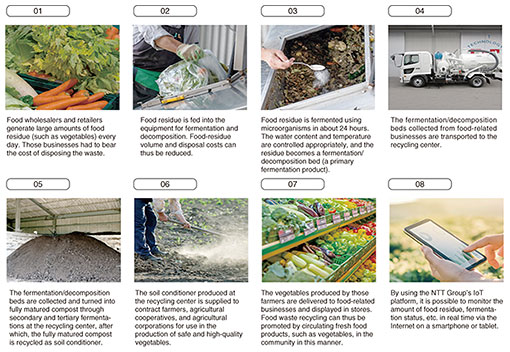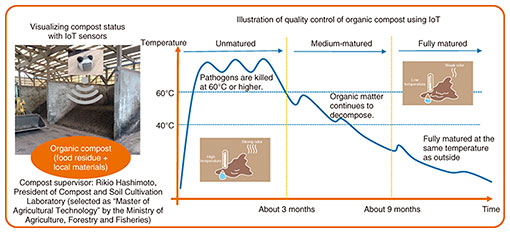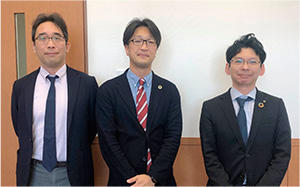 |
|
|
|
|
|
Feature Articles: Initiatives for Smart Agri—Making Japanese Agriculture a Growing Industry Vol. 19, No. 8, pp. 21–25, Aug. 2021. https://doi.org/10.53829/ntr202108fa3 Local Food Waste Recycling Solutions for Addressing the Sustainable Development GoalsAbstractAs a social information and communication technology (ICT) pioneer, NTT WEST and its group companies (NTT WEST Group, hereafter) aim to be a corporate group that is well-respected and trusted by the community by using the power of ICT to address local issues and create a sustainable society. NTT FIELDTECHNO, an NTT WEST Group company, whose core business is maintenance work in the regional telecommunication business, has enabled digital transformation of the food-recycling business by using ICT such as the Internet of Things and artificial intelligence. In partnership with Well Create Co., Ltd., which has excellent technical expertise in composting food residue, in April 2019, we started providing local food waste recycling solutions that contribute to the popularization of food waste recycling. This article introduces initiatives of NTT FIELDTECHNO concerning food waste recycling to address the United Nations’ Sustainable Development Goals. Keywords: food waste recycling, circular economy, organic agriculture 1. Status of food waste recycling and our solutions1.1 Local food waste recycling solutionsThe cost of introducing food waste recycling exceeds that of disposing of food residue as waste, and this has been a major factor preventing the spread of food waste recycling. To address this issue, the equipment for fermentation and decomposition of food residue provided by our local food waste recycling solutions uses microorganisms, which effectively decompose food residue such as vegetables. It can decompose and reduce the input food residue into a primary fermentation product that is five- to ten-times smaller in volume in a short time; consequently, it makes collection and transportation more efficient, thus reducing costs. We also provide a series of our solutions as a monthly service (including equipment rental to customers); therefore, an initial investment for introducing food waste recycling is not required on the customer’s side, and their monthly food-residue processing costs are significantly reduced (Figs. 1 and 2).
Our local food waste recycling solutions will be provided by NTT FIELDTECHNO, which provides on-site telecommunication maintenance services throughout Japan. In addition to renting and installing the equipment for food-residue fermentation and decomposition to customers, the company offers a variety of services, including regular maintenance (Fig. 3).
When introducing these solutions, we want to ensure that customers can enjoy the cost benefits; accordingly, we will (i) provide consulting before introducing the solution and, if necessary, (ii) carry out tests on decomposition/fermentation of food residue and odors as well as trials using actual equipment. Cost simulations and tests on food-residue decomposition are provided free of charge, so customers can implement these solutions without any initial investment and reduce their monthly food-residue disposal costs. A trial (lasting about three months) using actual equipment is available for a fee. 1.2 Information and communication technology (ICT)-based food waste recycling(1) Converting abandoned farmland into fields and improving fertility of farmland In Japan’s agricultural industry, the expansion of abandoned farmland, which has doubled in area in the past 20 years, is a problem. The main cause is the aging of farmers. However, it is also due to the deterioration of soil caused by the use of chemical fertilizers, which makes it difficult to grow crops, making farming less profitable. The abandoned farmland significantly affects neighboring farmers through growth of weeds and encroachment by pests such as insects. To solve this problem of abandoned farmland, together with the Compost and Soil Research Institute, we are working on using recycled organic compost—made by adding locally available organic materials (e.g., cow and chicken manure, rice husks, and rice bran) to food residue generated from our local food waste recycling solutions—and digitizing our knowledge (temperature, humidity, pH adjustment, etc.) concerning such compost. NTT FIELDTECHNO has developed a system for collecting data on the extremely difficult process of manufacturing high-quality organic compost. The system uses Internet of Things (IoT) sensors and other technologies to create stable, high-quality compost and potting soil on the basis of the collected data. Therefore, it supports soil preparation, which is the foundation of agriculture (Fig. 4).
We are currently conducting a joint demonstration with a large-scale agricultural corporation in Okayama Prefecture regarding a project called “Restoring Abandoned Farmland and Fertilizing Farmland” by using high-quality organic compost. We are demonstrating and comparing methods of fertilizing soil in a short period at low cost at a leaf vegetable field by capturing aerial images with drones and collecting data on the physics, chemistry, microbial properties, etc. of soil with IoT sensors. (2) Organic-farming support project Our local food waste recycling solutions will also tackle other issues facing the agricultural industry to create a “food-recycling loop.” For example, agriculture relies on intuition and experience, and expertise is passed down through experience and transfer. With the ongoing aging of farmers and the increase in the number of farmers abandoning their farmlands, the loss of this expertise has become an urgent issue. By using ICT, such as sensing and telecommunications that NTT WEST and its group companies (NTT WEST Group, hereafter) possess, we will promote not only composting and soil improvement but also digitalization of farming expertise to support organic farming. We are in the process of digitizing all processes of organic farming, such as selecting varieties, raising seedlings, planting, irrigation, and evaluation of nutritional value of crops, for multiple organic farmers who are growing cherry tomatoes and leaf vegetables. Through these efforts, we are verifying improved profitability through labor saving and automation. 2. Future developmentsThe COVID-19 pandemic has gone on for over a year and has increased people’s frequency of eating and cooking at home. Under these circumstances, new food-distribution markets, such as ready-to-eat meals and home delivery of meal kits, are expanding, and options for selecting food and ingredients are increasing. Amid such changes in the environment, it is expected that consumers’ food needs will become more complex and diverse; as a result, their awareness of food safety, food loss, and sustainability will further increase. The NTT WEST Group will build a resource-circulation smart value chain centered on the local food waste recycling solutions in light of these changes in market needs. In doing so, we want to provide consumers who are health conscious and nature-oriented with new value of a healthy and prosperous life within the circle of resource circulation and contribute to creating a sustainable society without food loss.
Authors: (from left) Fumihiro Nakanishi, Manager, Tokyo Metropolitan Area Sales Division, NTT FIELDTECHNO CORPORATION; Makoto Nakayama, Deputy Director, Tokyo Metropolitan Area Sales Division, NTT FIELDTECHNO CORPORATION; Kento Miyaoku, Director, Tokyo Metropolitan Area Sales Division, NTT FIELDTECHNO CORPORATION |
|













